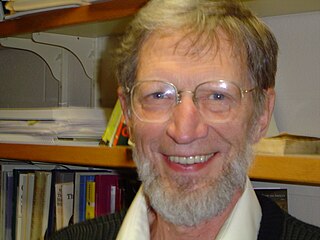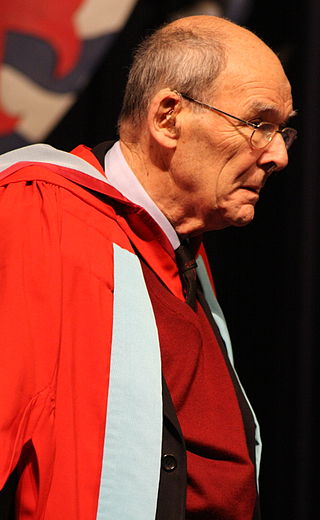Related Research Articles

Alvin Carl Plantinga is an American analytic philosopher who works primarily in the fields of philosophy of religion, epistemology, and logic.

John Leslie Mackie was an Australian philosopher. He made significant contributions to ethics, the philosophy of religion, metaphysics, and the philosophy of language.

William Lane Craig is an American analytic philosopher, Christian apologist, author, and Wesleyan theologian who upholds the view of Molinism and neo-Apollinarianism. He is a professor of philosophy at Houston Christian University and at the Talbot School of Theology of Biola University.
Gertrude Elizabeth Margaret Anscombe, usually cited as G. E. M. Anscombe or Elizabeth Anscombe, was a British analytic philosopher. She wrote on the philosophy of mind, philosophy of action, philosophical logic, philosophy of language, and ethics. She was a prominent figure of analytical Thomism, a Fellow of Somerville College, Oxford, and a professor of philosophy at the University of Cambridge.
Peter van Inwagen is an American analytic philosopher and the John Cardinal O'Hara Professor of Philosophy at the University of Notre Dame. He is also a research professor of philosophy at Duke University each spring. He previously taught at Syracuse University, earning his PhD from the University of Rochester in 1969 under the direction of Richard Taylor. Van Inwagen is one of the leading figures in contemporary metaphysics, philosophy of religion, and philosophy of action. He was the president of the Society of Christian Philosophers from 2010 to 2013.

Nancy Cartwright, Lady Hampshire is an American philosopher of science. She is a professor of philosophy at the University of California at San Diego and the University of Durham. Currently, she is the President of the Division for Logic, Methodology and Philosophy of Science and Technology of the International Union of History and Philosophy of Science and Technology.

David Malet Armstrong, often D. M. Armstrong, was an Australian philosopher. He is well known for his work on metaphysics and the philosophy of mind, and for his defence of a factualist ontology, a functionalist theory of the mind, an externalist epistemology, and a necessitarian conception of the laws of nature.
Francis J. "Frank" Beckwith is an American philosopher, professor, scholar, speaker, writer, and lecturer.
David Braine was a British analytic philosopher with interests in analytic philosophy of religion and metaphysics, who sought to marry the techniques and insights of analytical philosophy and phenomenology to the metaphysics of classical Thomism. His The Reality of Time and the Existence of God set out to prove the existence of God from the fact that the world enjoys continuity in time. He argued that nothing in the world could be the cause of this continuity, whence God came into the picture.
David Hugh Mellor was a British philosopher. He was a Professor of Philosophy and Pro-Vice-Chancellor, later Professor Emeritus, of Cambridge University.
Nancey Murphy is an American philosopher and theologian who is Professor of Christian Philosophy at Fuller Theological Seminary, Pasadena, CA. She received the B.A. from Creighton University in 1973, the Ph.D. from University of California, Berkeley in 1980, and the Th.D. from the Graduate Theological Union (theology) in 1987.

Michael Devitt is an Australian philosopher currently teaching at the Graduate Center of the City University of New York in New York City. His primary interests include philosophy of language, philosophy of mind, metaphysics and epistemology. His current work involves the philosophy of linguistics, foundational issues in semantics, the semantics of definite descriptions and demonstratives, semantic externalism, and scientific realism.
John Patrick Hawthorne is an English philosopher, currently serving as Professor of Philosophy at the Australian Catholic University in Melbourne, and Professor of Philosophy at the University of Southern California. He is recognized as a leading contemporary contributor to metaphysics and epistemology.
Steven Mitchell Nadler is an American academic and philosopher specializing in 17th-century philosophy. He is Vilas Research Professor and the William H. Hay II Professor of Philosophy, and was Max and Frieda Weinstein-Bascom Professor of Jewish Studies at the University of Wisconsin–Madison. He is also director of their Institute for Research in the Humanities.
Brian Ellis is an Australian philosopher. He is an Emeritus Professor in the philosophy department at La Trobe University in Victoria, Australia, and Professional Fellow in philosophy at the University of Melbourne. He was the Editor of the Australasian Journal of Philosophy for twelve years. He is one of the major proponents of the New Essentialist school of philosophy of science. In later years he has brought his understanding of scientific realism to the Social Sciences, developing the philosophy of Social Humanism. He was appointed a Fellow of the Australian Academy of the Humanities in 1972.

Peter Jeremy Roach Millican is Gilbert Ryle Fellow and Professor of Philosophy at Hertford College, University of Oxford, in the United Kingdom. His primary interests include the philosophy of David Hume, philosophy of religion, philosophy of language, epistemology, and moral philosophy. Millican is particularly well known for his work on David Hume, and from 2005 until 2010 was co-editor of the journal Hume Studies. He is also an International Correspondence Chess Grandmaster, and has a strong interest in the field of computing and its links with philosophy. Recently he has developed a new degree programme at Oxford University, in Computer Science and Philosophy, which accepted its first students in 2012. He currently hosts the University of Oxford's Futuremakers podcast, winning a CASE Gold Award in 2019.
Huw Price is an Australian philosopher, formerly the Bertrand Russell Professor in the Faculty of Philosophy, Cambridge, and a Fellow of Trinity College, Cambridge.
Alison Mary Jaggar is an American feminist philosopher born in England. She is College Professor of Distinction in the Philosophy and Women and Gender Studies departments at the University of Colorado, Boulder and Distinguished Research Professor at the University of Birmingham in the United Kingdom. She was one of the first people to introduce feminist concerns in to philosophy.
Susan James is a British professor of philosophy at Birkbeck College London. She has previously taught at the University of Connecticut and the University of Cambridge. She is well known for her work on the history of seventeenth and eighteenth century philosophy.
Helen Catherine Steward, is a British philosopher and academic. She is currently Professor of Philosophy of Mind and Action at the University of Leeds. Her research focusses on Philosophy of Action, Free Will, Philosophy of Mind and Metaphysics.
References
- ↑ "Exercise1.html". spot.colorado.edu. Archived from the original on September 20, 2000.
- ↑ About Tooley Archived 2013-11-23 at the Wayback Machine
- ↑ Tooley, Michael (1977). "The Nature of Laws". Canadian Journal of Philosophy, 7 (4): 667–698.
- ↑ Transcript of Debate With Craig
- ↑ Video of Debate With Craig
- ↑ Tooley, M. "Abortion and Infanticide". Philosophy and Public Affairs 2:1 (Autumn 1972): 37-65, at 52-53.
- ↑ Tooley, M. 1984. "In Defense of Abortion and Infanticide". In Pojman and Beckwith 1998: 209-233.
- ↑ Don Marquis and Michael Tooley on abortion and personhood
- ↑ "Fellow Profile: Michael Tooley". Australian Academy of the Humanities. Retrieved April 29, 2024.